Some of the worlds leading experts on global custody met in New York recently to discuss the challenges facing their industry. Global Finances publisher Joseph Giarraputo moderated.
Global Finance:
What impact have the Patriot Act and Sarbanes- Oxley had on custodians and their operations?

GEORGE EVANS,
executive vice president, BISYS: Theres renewed emphasis on compliance and regulatory services and more discussion around whether to provide those services inhouse or to use an outside provider. BISYS is contemplating a program relative to the proposed rule to serve as chief compliance officer for several firms that we currently service.
ALAN GREENE,
executive vice president, business head, US investment services, State Street: Most of the custodians had money-laundering procedures in place already, but there are aspects that have caused us to refocus thinking. It affects us twice as an organization because we certify our own results and because clients are coming to us, looking for us to sub-certify to what we do for them.
ROBERT DARMANIN,
senior vice president, The Bank of New York: Weve seen much more certification on a quarterly basis. Also weve seen increased awareness amongst our customers, especially intermediaries. Historically, the regulated mutual fund industry never focused on money laundering to the degree they do today.
TOM DANDREA,
director of global custody, Citigroup: Weve all been doing antim o n e y – l a u n d e r i n g know your customer for years, so its really just beefing that up. The Patriot Act is almost a paper c h a s e , though, and its probably going to become a bigger paper chase down the road, if and when we are required to look at our customers downstream customers. Its going to be very difficult. Pedelford
Lattimer, first vice president, Mellon Global Securities Services: We have had to provide extra training both for clients and internally. Weve had to refocus, but weve been doing this for a long time.Weve got a well-developed infrastructure in terms of controls, processing and being able to monitor and c o m m u n i – cate information.
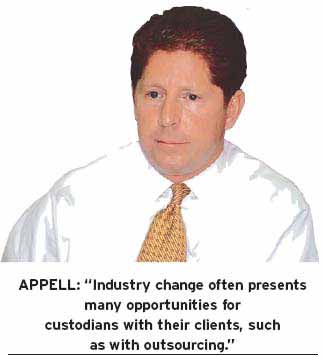
TIM CONNELLY,
partner, Brown Brothers Harriman:We see an increase in spending on technology. Its an added cost, but it puts a value on quality.Also, midand small-size firms that have leaner internal staffs and monitoring mechanisms are now looking for guidance with regard to best practices.Thats a value that a world-class custodian can offer.
STEVE APPELL,
senior vice president, Northern Trust: We see this as an affirmative resolution of the FDIC regulations of the early 1990s. As a trust bank, it is just a natural evolution of what we are hired to dokeep our clients assets warm and dry around the world and compliant with local regulatory authority. The technology, training and operational improvements all go with the territory.
DANDREA:
With the Patriot Act ever y customer has to have an identification number. We took it a step further and are doing it globally with all our customers, but the trouble we will face there is that you have to keep records for five years after an accountis closed. If you start to do that globally, you run into privacy laws. There are a lot of things that still have to be sorted out.
LATTIMER:
People are trying to address these issues in a number of different markets. If you are on the global stage, you really have to have an operating model and an infrastructure that allow you to address them in ways that are appropriate to the different markets you are doing business in.
EVANS:
A good example is the European Union savings directive that talks about international sharing of investor savings and investment income information to other members of the EU.
GREENE:
Some of the US legislation will spill over into the rest of the world.
GF:
New York States attorney general Eliot Spitzer has revealed a widening pattern of improprieties in mutual fund trading. How is this going to impact custodians?
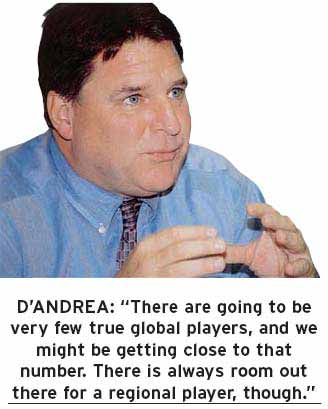
GREENE:
On the issue of market timing we can help by fair valuing funds portfolios. If you do this you can help eliminate the arbitrage opportunity. Second, we need to support industry efforts to restore investor confidence.
DARMANIN:
Eliminating market timing may mean changing the time for the calculation of asset values or calculating them several times during the day. That will add cost and possibly lead mutual fund companies to outsource those types of operations. Alternatively, exchangetraded funds may see a resurgence of momentum.
DANDREA:
Regulators are also focusing on possible conflicts of interest. The onus will be on the banks to eliminate them. Well no longer be able to claim its industry practice.
CONNELLY:
Eliminating conf licts of interest is something clients will seek.That becomes a tougher issue as the industry consolidates and you get a myriad of conflicts of interest just because of the nature of the corporate entity itself.
EVANS:
More interesting are some of the possibilities that arise from new legislation and policies. Cut-off evaluation is one issue: How can we consistently redefine that across all the markets? Another is fair valuation. A third is legal administration. We are finding huge consulting opportunities around these issues.
LATTIMER:
With the current regulatory environment and the issues that managers are already focusing onfiguring out how to enter new geographies, change distribution channels or launch new productswere seeing much more potential for outsourcing. Weve seen increased demand for analytics systems and for consulting services, for example.
APPELL:
We see the evolution of that need but not yet the full acceptance of it. In the end, however, industry change such as this often presents many opportunities for custodians with their clients, such as with outsourcing.
GF:
What regulatory developments around the world should our readers be aware of?
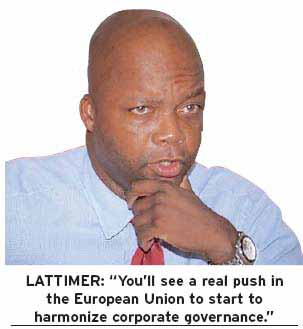
EVANS:
There will be a lot of things coming out of the European Union in the next few years, as well as developments in offshore locations.
GREENE:
A lot of regulatory developments globally will mirror those in the US. Large pieces of US regulation are transportable to other environments, although some local regulations will be tailored to the local set- tlement practices of that particular market.
DANDREA:
Changes in the way custodians can charge mutual funds for trustee compensation will have a big impact.We are going to have to change how we get paid. For example, the broker dealer side of the bank will not be able to pay sales incentives to the transactions side of the bank.
LATTIMER:
We continue to see regulators try to facilitate the growth of capital markets. You are going to see a real push in the European Union to start to harmonize corporate governance and harmonize tax laws so that they can continue to keep institutional investors interested in their markets.
DANDREA:
One legal development is the cases, such as Enron, that are looking at trustees responsibilities. These could have a far-reaching effect on everything we do. And a development that may create a growth area for our industry is the regulation of hedge funds.
APPELL:
The implementation of Basel II further down the road will also be important, as will the different application approaches to the accord between the US and Europe.
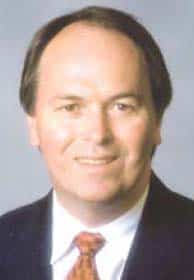 Commenting on outsourcing in the custody market, Neil Henderson, senior vice president and securities processing and fund services executive for JPMorgan Investors Services, says: The market has been driven by the bursting of the dot-com bubble. Money managers find their revenues down and are looking for ways to concentrate on their core competencywhich is managing money. We try to help them do that. JPMorgan offers its outsourcing services discretely. Clients can take as much or as little as they want in areas like fund accounting and middle-office processing. This way clients can see how we perform before passing more functions to us. says Henderson. |
GF:
What has been the custody markets appetite for outsourcing? What products and services have been most popular?
GREENE:
The market is enormous more than 500 firms, assets of $30 tri l – lionso its easy to understand why there is so much interest in this area. Key areas are post-trade management, warehousing, portfolio record keeping, forms and analytics, risk management tools, counter party communications, and a variety of client reporting. People are getting more comfort – able outsourcing even large, c o m p l e x processes.
EVANS:
There is enormous opportunity. The o u t s o u r c i n g concept around custody and securities lending has long been accepted, but its evolution continues. We are seeing great opportunities in hedge fund servicing and private equity servicing. And there is opportunity in the separate account market. Also, for the first time, we are seeing bulge bracket mutual funds looking hard at whether they need to be in the fund servicing business. They have performance issues, and they are looking hard at their expense base. We are seeing the same phenomenon now in the 401K market.
APPELL:
While some of the larger opportunities are in full back-office outsourcing, we do not see outsourcing as a predetermined package, but as an entire value chain of back-office activities cust o m i z e d around individual client needs. Clients find this component approach very compelling.
DARMANIN:
The evolution of outsourcing is initially cost driven. The most popular outsourcing applications are those that would require additional investment. Weve seen successful outsourcing projects of late in the hedge fund industries and in the separate account marketplace.
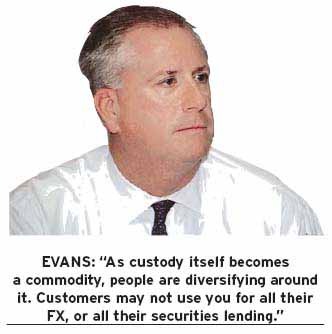
LATTIMER:
As markets continue to g e t stronger, people will now have the luxury to take a look at things like outsourcing and make some real decisions.And in a strong market, the real cost savings from an outsource relationship can be great enough to justify the upfront cost.
DANDREA:
Europe is leading the way: The appetite is much bigger there than in the States. But you have to be careful which deals you choose because they are all huge. Once you choose a deal, the market boxes you out of a lot of other opportunities.
CONNELLY:
With complete outsourcing there are concerns about the lack of diversification, so we take an open architecture, b e s t – o f – breed app r o a c h . One organization is not going to do everything well. In that context, we have been focusing on certain areas that can enhance connectivity.We have developed a router product that is designed to make it look in the back office like you can deal with one portal or one entity but, at the same time, plug in the best outsourcing solutions.
GF:
What issues are developing in the operational risk management area?
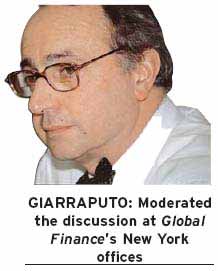
GREENE:
The principal regulators are becoming more involved. We are starting to see increasingly specific guidance on how these plans should be developed and operated.
DANDREA:
The most recent development on our side, directed for us by the regulators, is what we are calling extreme continuity of businesshow we would cope if a building was just gone.We are working with the Fed, with the depository trust company, making sure that we have backup. Its a huge effort, but unfortunately its something we really have to do.
CONNELLY:
One result of this is a spirit of cooperation between providers and customers. This is a shared operational risk that leads to a sharing of information, which enhances the relationship we have with our customers.
APPELL:
The geographic dispersion of data centers is an issue: You need them to be far apart but not too f a r . A n d theres the i n e v i t a bl e expense issue. Weve all signed up for additional data centers, and its a huge expense. The key is to leverage that expense via increased operational efficiencies.
DARMANIN:
It has also shown how important it is to have global platforms that operate using the same applications. That gives you a real ability to switch on other service and data centers in the event of a disaster.
EVANS:
There is a new focus on auditors to sign off on business continuation. A lot of firms are looking at that now.
LATTIMER:
There is a lot more precision today when it comes to continuity planning. Not only should you be able to continue your operation; you have to make sure there is no downside in compliance, regulatory observation or monitoring. Its a much more complete environment that you need to be able to recover to.A lot of clients are really wrestling with that.
GF:
How are custodians servicing clients in the $500 billion alternative investment market?
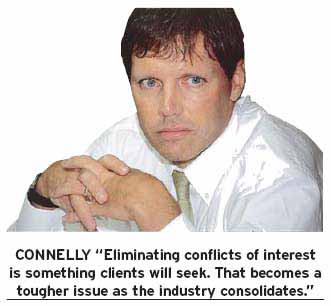
GREENE:
This is basically a build or buy decision.We elected to buy because the asset class was growing so rapidly.This business is pretty complicated but has excellent growth potential. The regulatory reforms under way will make customers more comfortable with these products, which will be good for everybody in the business.
LATTIMER:
Our Eagle Investment Systems subsidiary developed in partnership with Morgan Stanley Prime Brokerage a system called PTS Plus that provides hedge funds with an integrated solution that will handle all aspects of their fund, partner and shareholder accounting and reporting.We are excited about the alternative investment arena. When you look at the returns that investors are seeking, alternative asset classes will continue to make more sense.
EVANS:
I think that you have to buy to be a meaningful player. If you don’t, youll be on the periphery. This market is global, and its a huge growth story: These are sophisticated products, but at the end we are offering a lot of the very same services whether it be accounting or tax.
CONNELLY:
This is one of the great frontiers. Regulation will be moving our way in this asset class, with regard to arms length, separationthe need for a cus- todian in the process.Youll have to be nimble and customized, because all these alternative investments have a different slant so its a little more difficult to leverage this business.
DARMANIN:
We also bought our capability in this market.We saw this very much as an additional service that our clients were looking to obtain from us as part of the range of services that they expect from a custodian bank.
GF:
Some observers are questioning the value and wisdom of clients keeping exclusive custody relationships. Do you agree that diversification of providers will reduce risk and, in the long run, lower costs?
DARMANIN:
Clients increasingly want to consolidate with one service provider. It gives them more leverage from a buying power point of view, and more uniform information.
DANDREA:
Its only the largest of the large that choose multiple providers. A lot of it has to do with technology:You don’t have to manage two different custodians, two different interfaces, so it is more cost effective. The large customers are going to get the fees they want.
LATTIMER:
The level of integration and the ability to support multiple product lines, the technology required to deliver information, the type of relationship that clients want with service providers, is very different than in the past.Today it doesnt make sense to have multiple custody providers.
EVANS:
As custody itself becomes a commodity, people are diversifying around it. Customers may not use you for all their FX, or all their securities lending. The focus in todays buy is less custody-centric.
APPELL:
While custody is at the core and it brings the assets into the shop, its the higher-value type products that help build the relationship for us and add the most value for the client.They make the relationship more meaningful so you do not pick it apart from a profitability standpoint.
CONNELLY:
I find it difficult to understand why an ind e p e n d e n t trustee would decide it was in their best interests to go to one provider. You might have a majority custodian, but you will have one or two other players to provide that pricing benchmark, so you don’t have all your eggs in one basket.
GREENE:
Companies do look at each of those services individually to make decisions on each of those services. Once they have satisfied themselves that they are getting best-of-breed in each of those categories, then the deal has to make sense in the aggregate financially.
GF:
The custody industry continues to consolidate around fewer and fewer providers. Is this process of consolidation over? If not, where will it lead?
EVANS:
There are a lot of bit players in the custody game that have to be considering cashing out while their business is at a premiumbefore it continues to erode. The bigger players, too, have to think very hard about transforming their business model and finding alternative revenue streams and look creatively at partnerships and alliances.
GREENE:
Consolidation is definitely not over. Size matters in this business. Scale drives unit costs.We expect that there will be very few global full-service fully dedicated firms specializing in this business.Those that survive and succeed will have to be, we think, exclusively fo c u s e d on asset s e r v i c – ing.
D A N – DREA:
It has to end at some point. There are going to be very few true global players, and we might be getting down close to that number now. There is always room out there for a regional player, though, a niche player.
APPELL:
Size and scale matter to a point. But clients are looking for two things: real value and focused capabilities. They are looking at how closely focused your business is in supporting the custody function, and if you can compete in terms of costs. If they like the answers, theres a good chance youll remain in that business.
CONNELLY:
There is enough there for a couple different types of firms to prosper. The smaller players that have custody as their primary business still have a place at the table because, as the consolidation continues, it creates an interesting byproduct whereby your business partners become your competitors.
Edited by Dan Keeler



